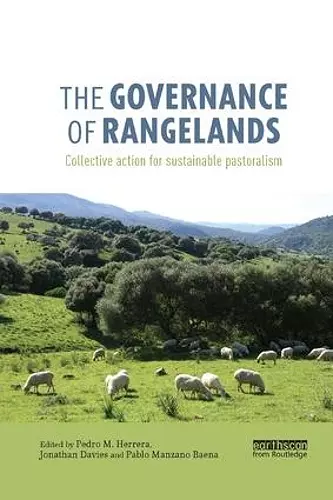The Governance of Rangelands
Collective Action for Sustainable Pastoralism
Jonathan Davies editor Pedro M Herrera editor Pablo Manzano Baena editor
Format:Paperback
Publisher:Taylor & Francis Ltd
Published:12th Oct '17
Currently unavailable, and unfortunately no date known when it will be back
This paperback is available in another edition too:
- Hardback£150.00(9781138785144)

Rangelands are large natural landscapes that can include grasslands, shrublands, savannahs and woodlands. They are greatly influenced by, and often dependent on, the action of herbivores. In the majority of rangelands the dominant herbivores are found in domestic herds that are managed by mobile pastoralists. Most pastoralists manage their rangelands communally, benefitting from the greater flexibility and seasonal resource access that common property regimes can offer. As this book shows, this creates a major challenge for governance and institutions.
This work improves our understanding of the importance of governance, how it can be strengthened and the principles that underpin good governance, in order to prevent degradation of rangelands and ensure their sustainability. It describes the nature of governance at different levels: community governance, state governance, international governance, and the unique features of rangelands that demand collective action (issues of scale, ecological disequilibrium and seasonality).
A series of country case studies is presented, drawn from a wide spectrum of examples from Africa, the Middle East, Central Asia, Europe and North America. These provide contrasting lessons which are summarised to promote improved governance of rangelands and pastoralist livelihoods.
"It is not through universities but through daily practices. It is not through few academic years of study or research but through centuries of love and interaction. It is not through greedy private ownership but through collective rights and stewardship that we, pastoralists, learned how to and did keep the rangelands for "us" and others to enjoy them, feeding our livestock, fighting diseases maintaining our souls and contributing to carbon capturing. It is time that all states and controlling parties recognize and respect pastoralists' collective land rights as a legal and legitimate way of governance so that sustainability of pastoralism is ensured, and pastoralists’ contribution to food security and carbon sequestration is continued. This book is an important contribution showing many experiences of cooperation based on the traditional knowledge and the sense of ownership of the communities to rangelands. The book brings successful stories of rangeland governance where win-win situations are achieved and conflict among different communities has reduced. The variety of success stories should inspire us all to follow the proven success for a more flourishing and peaceful planet!" – Khalid Khawaldeh, Member, World Alliance of Mobile Indigenous Peoples (WAMIP)
"A clear, empirically based, and well-argued manifesto for how to reverse decades of ill-informed policies, and instead recognise and support one of the planet's most sustainable production and land use systems – starting with the critical step of protecting the territorial rights of pastoralists" – Michael Taylor, International Land Coalition Secretariat
"It was in the early nineties and I visited Chad late in the long, dry season. In the Batha Province, north of the provincial capital Ati, I came across lush grasslands where Dorcas Gazelles abounded. There were empty villages with many granaries, all full of millet. An old man that had stayed behind told us that the herdsmen, owners of the granaries and the traditional waterholes, were still in the South, but moving northwards. They would soon be back. Granaries and grass were to feed the herdsmen, their families and livestock before the rains would arrive, new grass would grow and fields with Millet could be harvested again for the next cycle. I realized that I was witnessing some of the last vestiges of pastoral traditions in Africa. Here, traditional management of natural resources survived, respected by all stakeholders. Transhumant and nomadic pastoralists are not always popular with some governments. Their ephemeral stay in places makes them difficult to control, to tax. And yet, as the above example shows, their traditional way of life is based on sound ecological principles. There are lessons to be learned. Lessons that may need to be adapted to the requirements of modern times, but we should make sure not to lose access to this rich source of indigenous knowledge." – Piet Wit, Chair, IUCN Commission on Ecosystem Management
ISBN: 9781138574816
Dimensions: unknown
Weight: 453g
298 pages